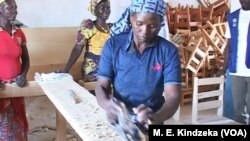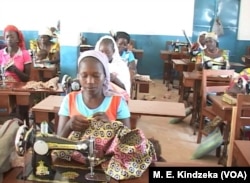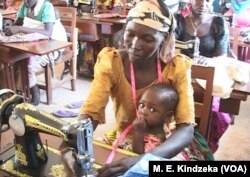Hundreds of Nigerian refugees who have fled the Boko Haram insurgency to the Minawao camp here in the country's north are being trained in sewing and woodworking through a United Nations program. Intended for people who agree to voluntarily return to their homelands, it offers participants potential for self-reliance.
A majority of the carpenters and seamstresses are mothers.
Naomi Haman, a 29-year-old mother of two, cuts wood with a hand saw to make a bench for the Minawao refugee camp school. The refugee, who has been in the camp for two years, is completing six months of carpentry training.
"She came to be a carpenter so that even if she goes to Nigeria, she will be able to make things like chairs or stools, so that [skill] can help her," says a Nigerian interpreter.
Haman's know-how already provides her with some income. She had depended solely on her husband before he was killed by Boko Haram in Nigeria. After fleeing to Cameroon, she counted on humanitarian assistance, she says. She will receive about $5 when she finishes the bench and turns it in to the school that supplied the wood.
Near Haman's carpentry workshop, Theres Mami works on a sewing machine. The Cameroonian also benefits from the United Nations training program, saying she can now mend torn dresses and get paid for her work.
The trainers include members of the host communities. They started by drawing types of dresses on the board for them to identify and also draw. From there, the students moved to various workshops where they were taught to stitch the items they'd drawn.
The skills training project is part of the UN refugee agency UNHCR’s initiative to raise refugees' self-reliance and social and economic standing through education and vocational training.
It encourages refugees and their hosts to interact to combat discrimination and reduce tensions and the scramble over already stretched natural resources.
Mamady Fata Kourouma, head of UNHCR in far northern Cameroon, said the training also would be useful to the refugees when they voluntarily accept to return to Nigeria
UNHCR contends the training gives refugees hope by enabling them to be independent and useful to themselves, their families and communities, he said. He added that the agency expects newly trained refugees to encourage and train others in the camp who otherwise are idle. Unskilled refugees could be a burden when they return to their country.
Sixty percent of the Nigerians enrolled in the training are women. They say they will need financial assistance from the U.N. and the Nigerian government to be able to set up businesses when they return.






